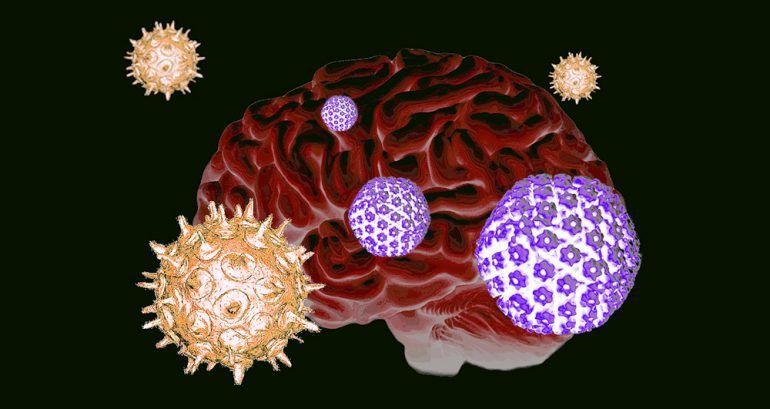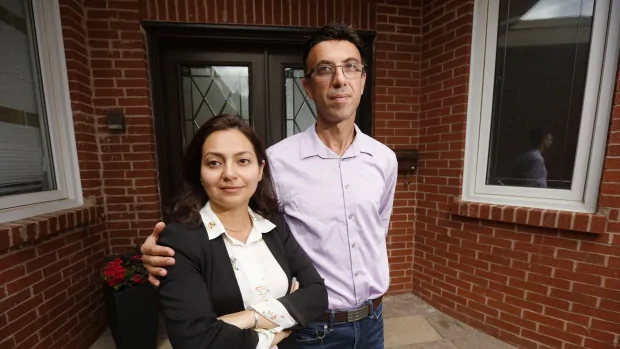Viral double whammy: Anyone who has a cold sore and has had chickenpox before may be at increased risk of Alzheimer’s. Because when the viral pathogens of both diseases — herpes simplex virus and varicella zoster virus — come together in the brain, it can trigger the formation of Alzheimer’s-specific protein plaques. The reason for this is probably an inflammatory response that reactivates the dormant herpes virus, reports a research team.
Whether it is a cold, chickenpox, shingles or Epstein Barr: The viral causative agents of these diseases all belong to the herpes virus. A distinctive feature of these DNA viruses is their ability to remain latent: after the initial infection, they remain in the body forever and remain in a sort of dormant state. Only when the immune system is weakened, the herpes virus reactivated,

According to WHO estimates, two-thirds of all people have a cold sore, the causative agent of herpes simplex 1 (HSV-1). 95 percent of people are infected with varicella zoster, the cause of chickenpox and shingles.
Alzheimer’s is caused by the herpes virus?
It has long been suspected that herpes viruses also play a role in Alzheimer’s dementia. Evidence of this is provided by the increased incidence of certain herpes viruses. in the brain deceased Alzheimer’s patients, but also laboratory experiments with tissue cultures of human brain cells. Among them was a team led by Dana Carins of Tufts University in Massachusetts. discoveredthat infection of these cultures with herpesviruses may lead to increased formation of neurotransmitters and protein deposits typical of Alzheimer’s.
In another study, Cairns and colleagues now examine in more detail what is behind this and when the herpes virus can cause such Alzheimer’s symptoms in the brain. To do this, they grew three-dimensional tissue cultures from neuronal stem cells, which included human neurons and their supporting cells, glial cells. They then infected these cell cultures with herpes simplex and/or varicella zoster.
Alzheimer’s plaque after double infection
It turned out that if brain cells were infected only with the herpes virus varicella zoster, this caused damage to glial cells and the release of inflammatory messenger substances – but no Alzheimer’s plaques. However, this was different if brain cells had recently been infected with herpes simplex: double infection reactivated the dormant HSV-1 virus and triggered the rapid formation of misfolded amyloid beta and tau proteins – Plaques that are typical of Alzheimer’s.
As a result of this viral chain reaction, brain cells in the cultures became less active and eventually died. “Our results suggest that varicella infection causes inflammatory signals in the brain, which in turn wake up herpes simplex,” explains Cairns. This supports an indirect role of the chickenpox pathogen in Alzheimer’s dementia. Also, this may explain why a latent infection with herpes simplex alone is not enough to trigger the disease – the virus has to be reactivated.
“It is a double whammy from two viruses that are very common but are mostly harmless when seen on their own. But when they come together, it can cause problems,” explains Cairns.
shingles vaccine can protect
The fact that people who have been vaccinated against chickenpox and shingles are less likely to develop Alzheimer’s also fits with the “collaborative” role of the chickenpox virus. Cold sores on their lips are also less. Cairns and his team attribute this to the fact that the “awakening” effect of inflammation produced by the varicella virus on latent herpes infection fails to manifest. The HSV-1 virus remains dormant and therefore cannot manifest its harmful effects.
However, whether shingles vaccination, which is recommended for older people anyway, can actually protect against Alzheimer’s or at least reduce the risk needs to be investigated more closely. The researchers also postulated that HSV-1 Vren in the brain may also be reactivated by other actors and influencing factors. “It’s possible that other inflammatory events in the brain also cause the herpes virus to resurface,” Cairns says. These include risk factors such as head trauma, obesity or alcohol use. (Journal of Alzheimer’s Disease, 2022; doi: 10.3233/jad-220287,
Source: Tufts University

Web guru. Amateur thinker. Unapologetic problem solver. Zombie expert. Hipster-friendly travel geek. Social mediaholic.





